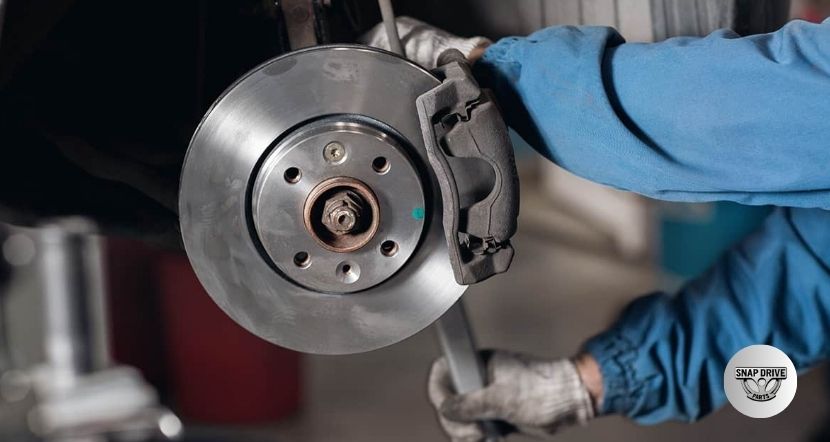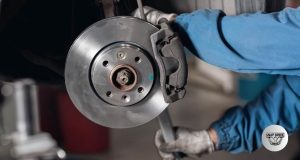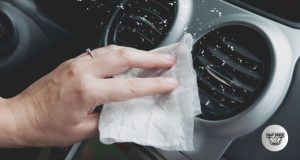Have you ever felt your brakes losing power just when you needed them most? That’s brake fade, and it can be dangerous.
Understanding what brake fade is and how to prevent it could save your life. You’ll discover simple tips to keep your brakes working perfectly every time you press the pedal. Stay with me, and learn how to protect yourself and your vehicle from this hidden risk.
Contents
Causes Of Brake Fade
Brake fade happens when your brakes lose power. This makes it hard to stop your vehicle safely.
Several reasons cause brake fade. Knowing them helps you keep your brakes working well.
Heat Buildup In Brakes
Brakes work by creating friction to slow your wheels. This friction makes heat. Too much heat causes brake fade.
When brakes get very hot, parts can expand and lose grip. This reduces braking power and increases stopping distance.
- Long downhill drives can cause heat buildup
- Repeated braking in traffic raises brake temperature
- Heavy loads put more stress on brakes
Brake Pad Wear
Brake pads press against rotors to stop your car. Over time, pads wear out and get thinner.
Worn pads create less friction and heat up faster. This leads to brake fade and unsafe stopping.
- Old brake pads lose their material
- Hard braking wears pads quickly
- Low-quality pads wear out faster
Fluid Boiling Issues
Brake fluid transfers force to brake parts. It must handle high heat without boiling.
If fluid boils, it creates air bubbles. Air compresses, so brakes feel soft and weak.
- Old brake fluid absorbs moisture easily
- High temperatures make fluid boil
- Boiling fluid lowers brake response

Credit: www.carparts.com
Signs Of Brake Fade
Brake fade happens when your brakes lose their power. It can make stopping your car harder and unsafe. Knowing the signs helps you stay safe on the road.
Look out for changes in how your brakes feel or sound. These clues tell you when your brakes are not working well.
Reduced Braking Power
You may find your brakes take longer to stop your car. The brake pedal feels normal but the car slows down less than before. This means the brakes are not as strong as usual.
- Longer stopping distance
- Brake pedal feels firm but car moves more
- Need to press the pedal harder
- Brakes do not respond quickly
Spongy Brake Pedal
If the brake pedal feels soft or squishy under your foot, this is a sign of brake fade. It may push down too easily or go all the way to the floor. This means the brake system has a problem that needs fixing.
| Feeling | What It Means |
|---|---|
| Soft or spongy pedal | Air or fluid leak in brake lines |
| Pedal sinks to the floor | Brake fluid loss or worn parts |
| Pedal feels normal but brakes weak | Brake fade from overheating |
Unusual Smells Or Sounds
Strange smells or noises can show brake fade. A sharp or burning smell means the brakes are too hot. Squealing or grinding sounds mean worn parts or damage.
Common brake fade smells and sounds include:
- Burning odor like hot metal or rubber
- High-pitched squealing when braking
- Grinding noises during stops
- Clicking or scraping sounds
Preventing Brake Fade
Brake fade happens when brakes get too hot. This makes them less effective and unsafe.
Preventing brake fade is important for safe driving. You can stop it with good care and habits.
Regular Brake Maintenance
Check your brakes often to keep them working well. Worn pads or low fluid can cause brake fade.
Replace brake parts as needed. Clean brake components to avoid dirt and dust build-up.
- Inspect brake pads and discs monthly
- Change brake fluid every 1-2 years
- Listen for unusual noises when braking
- Clean brakes during regular service
Using Quality Brake Components
Use good quality brake pads and discs. Cheap parts wear out fast and cause overheating.
Choose parts made for your car model. Quality parts help stop heat build-up and fade.
- Buy brake pads from trusted brands
- Use discs designed for your vehicle
- Avoid low-cost, low-quality parts
- Consider performance parts for heavy use
Proper Driving Techniques
Drive in ways that reduce brake heat. Avoid riding the brake pedal or hard stops.
Use engine braking on hills. Slow down early to keep brakes cool and working well.
- Press brakes gently and smoothly
- Downshift on long descents
- Keep safe distance to avoid sudden stops
- Plan stops to avoid heavy braking

Credit: www.youtube.com
Emergency Tips During Brake Fade
Brake fade happens when your brakes lose power and do not stop the car well. It can be scary, especially in emergencies.
Knowing what to do during brake fade can keep you safe. Use these tips to control your car and stop safely.
Downshifting To Slow Down
Downshifting means changing to a lower gear to slow your car. This helps reduce the need to use brakes.
Use the gear shift gently and avoid sudden changes. This will help slow the car without losing control.
Using Engine Braking
Engine braking uses the engine to slow the car instead of the brakes. It works by releasing the gas pedal.
This method lowers speed gradually. It is helpful when brakes are weak or overheated from heavy use.
Safe Pull-over Strategies
If your brakes fade, try to pull over safely. Use your signals and look for a clear spot on the road.
Slow down using downshifting and engine braking as you find a safe place to stop. Turn on hazard lights once stopped.

Credit: www.youtube.com
Frequently Asked Questions
What Causes Brake Fade During Driving?
Brake fade happens when brakes overheat and lose stopping power after heavy use.
How Can I Recognize Signs Of Brake Fade?
Soft brake pedal, longer stopping distance, and unusual smells signal brake fade.
Why Is Brake Fade Dangerous For Drivers?
It reduces braking ability, increasing the risk of accidents on the road.
What Are Effective Ways To Prevent Brake Fade?
Use proper braking techniques, avoid constant heavy braking, and maintain brake parts well.
Can Brake Fade Affect All Types Of Vehicles?
Yes, brake fade can happen in cars, trucks, motorcycles, and any vehicle with brakes.
Conclusion
Brake fade lowers your stopping power when brakes get too hot. It can make driving unsafe, especially on long hills or in heavy traffic. To prevent brake fade, keep your brakes well-maintained and avoid riding the brakes. Use engine braking on steep roads to reduce heat buildup.
Regular checks and using quality brake parts help too. Stay alert and know how your brakes feel during driving. Safe braking keeps you and others protected on the road. Remember, prevention is better than dealing with brake problems later.





